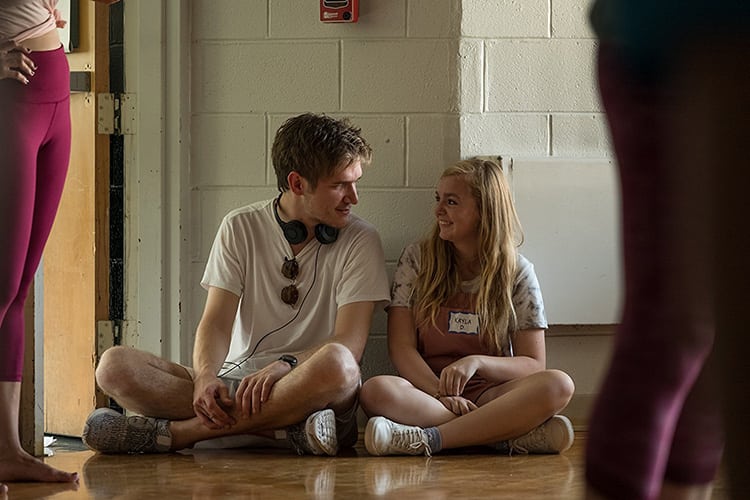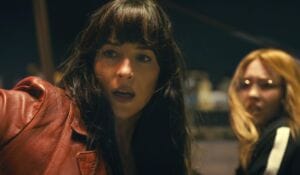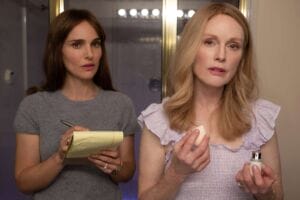In April, I joined a group of film critics for a conversation with comedian and musical personality Bo Burnham. He recently launched onto the filmmaking scene with his debut movie “Eighth Grade,” a coming-of-age story that explores the titular school year through the eyes of a social media-obsessed girl. The conversation lasted half an hour, but I’ve edited it for length and included the segments that most reflect Burnham’s thoughts on the platform, YouTube, that launched his career.
Kevin Kittle: First off, love the film.
Bo Burnham: Oh, appreciate it.
KK: There’s a lot of coming-of-age stories out there, but I felt like yours stood out. You wrote from the perspective of an eighth-grade girl—did you have any hesitations about that? How did you find this character?
BB: I just really wanted to write about the Internet and how I felt at the time—which was nervous, and my nerves felt connected to the Internet. So I wrote a ton of stuff with all these different characters, and stumbled on her and finally could say everything I wanted through her. After the fact, I was violently aware that I was a man, so I was proceeding with caution—but yeah, it just felt natural to me. I watched hundreds of videos of kids online talking: the boys talked about Minecraft, and the girls talked about their souls. At that age, at least, the girls were a little—severely more deep and interesting. So I saw myself in her more. The things I struggle with about the Internet are how I see myself and how I see other people see me, and I think girls are forced to see themselves in that narrative a lot earlier than boys. I don’t even know what boys are thinking about at that age. I met a lot of them and I still don’t know what they’re thinking about.
[All laugh]
Shari Green: Would you want to live in a time before the Internet?
BB: I don’t—no, no, I don’t think so. I mean, probably—no, I—no. I’d probably be happier or something, but I’m inextricable from it, I’m wired with it. I definitely wouldn’t want to write about another time. I feel lucky to be part of—I think it’s a reckoning, in a way, it’s a big cultural reckoning—this is getting way, way off topic.
[All laugh]
BB: I don’t know. It’s an interesting time; it’s an interesting time to be alive, and to be American, and to be in the culture.
[Pause]
BB: Yeah, I’d probably like to be in another time. Is that what we were saying?
[All laugh]
BB: Go back to cassette players—and half of the country not hating the other half of the country, that sounds fine.
Ryan Bordow: Is there a time when that wasn’t happening?
BB: Yeah, you know maybe, that’s probably right. There’s just a sense of visibility that’s crazy.
RB: You’ve spoken about how anxiety informs this movie, both in Kayla’s mental health and your experience with social media. The existentialists say that to be anxious is to be human—do you think that social media is just another conduit for anxiety? If it didn’t exist, would an eighth grade girl have found a different outlet?
BB: Yeah, definitely. It’s human and everything, but it’s more that innovation works in a lot of areas. Oh, it took an hour to get to work on your horse, and now it takes half an hour to get to work in your Model T. Now it takes ten minutes to get there in your Ford Focus—good. Good, innovate. That’s great. To innovate socially: there’s no reason that’s good. Oh, you can have a conversation with your friend, now you can have twenty conversations with twenty friends. Oh, you can see a photo of yourself two weeks after you give it to CVS, now you can see a thousand photos of yourself right away. That’s where I think the anxiety comes from. There’s a natural sense of anxiety that I think everyone will have, just because—like they say—to be human is to be anxious or to be self-reflective. But there is a mechanism right now that encourages it and ramps it up. I feel like I am anxious to the degree I am because of the Internet. Social media is becoming efficient at the level that all other areas of technology are efficient, and there’s no proof that human interaction has to be perfected and sped up like everything else does. Yeah, let’s make high-speed railways; do we need to make high-speed conversation? High-speed national conversation? Balkanized, atomized news in the form of Twitter? It’s a very capitalist view of the social. I think this social media showing up is more significant than the Internet showing up. Because the Internet is just like, “ok, take all the information and all the libraries and s*** and now you have access to it all.” High-speed information is cool. High-speed feelings? High-speed feelings about yourself, relationships with other people? That s***’s deadly. You should be able to go to the library and type a thing up-
[Bo types furiously on the table]
-and get any entry in the history of the world. But to apply that to relationships, and the relationships of children, and the self-perception of children, is crazy. And it’s literally not spoken. I just can’t believe that, eight years into this thing, I’m struggling to articulate this because I’ve never heard it said out loud. I don’t understand it. There’s twenty-thousand conferences for Twitter, Facebook, social media, all that stuff—never at one point do we say, “should we be doing this? Is this good? Is this making people better friends?” Of course not, it’s laughable that Facebook is making you better friends with people. Is there anyone on the Internet that you like more on the Internet than you like in real life? No. Are there plenty of people that you like in real life and hate on the Internet? Yes. It’s crazy to me. So, that’s a big, long, rambling answer of that question.
RB: It’ll be fun to transcribe.
[All laugh]
BB: But yeah, that’s vaguely what I feel about it. I think it has a direct line to my anxiety, to a kid’s anxiety. She would be nervous without social media, for sure. Without the Internet, she would be sort of nervous—but it’s not helping. It’s not.




